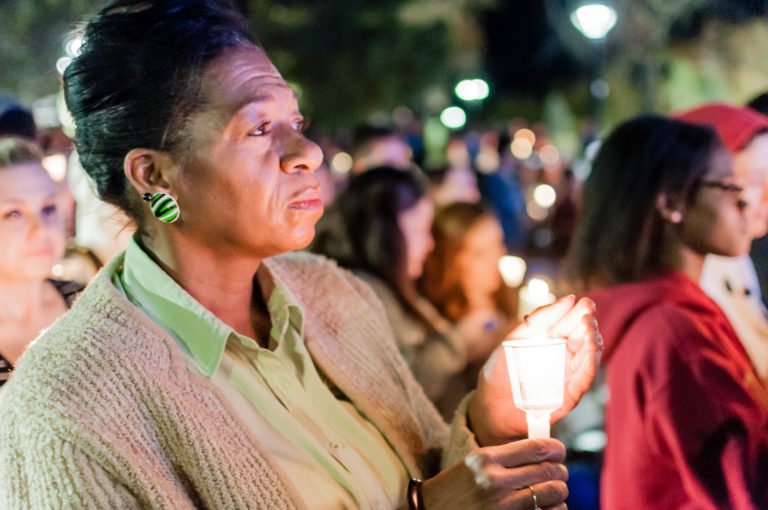
Image by Steven Hall.
Managing Our Own Terror
In the wake of the San Bernardino shooting, a terrorism expert named Jessica Stern wrote the following wise words in The New York Times:
“If we are to prevail in the war on terrorism, we need to remember that the freedoms we aspire to come with great responsibilities. And these responsibilities involve not just fighting terrorists, but also managing our own terror.”
My Facebook feed fills up with venom for Donald Trump and his depraved lunge for attention. The Daily Show pillories the major news outlets for sorting through the accused killers’ personal belongings, airing photographs of little children at birthday parties as if they were fair game for ratings grabs. Valarie Kaur, a filmmaker and a spiritual visionary, is barred entrance to board her flight until she shows her breast pump, suspected of being some kind of terrorist pawn simply because she is Sikh.
As I watch this country thrash about, seemingly in fight-or-flight free-for-all, I’ve been quietly searching my own heart: What does it mean to manage our own terror?
Stern writes about something called “terror management theory”:
The theory says that when people are reminded of their mortality — especially if the reminder doesn’t register consciously, as happens after a brutal act of terror — they will more readily enforce their cultural worldviews. If our cultural worldview is xenophobic, nationalistic or moralistic, we are prone to become more so. Hundreds of experiments, all over the world, have confirmed these findings.
In other words, the fact that Donald Trump has become a caricature of himself is no surprise. He’s managing his own unconscious fear of death by becoming even more certain of his worldview. Tragically, he has a big megaphone with which to amplify his hateful coping, but that doesn’t mean he’s the only dangerous one.
Each and every one of us has the capacity to act dumb with fear. Each and every one of us must resist the comfort of blanket beliefs (whether they be about all Muslims or all NRA-members or all people struggling with mental illness). This is not to say that the time doesn’t demand a moral stand, but we are safer only if this morality is rooted in our wisdom over time about what works and what’s right, not our nervous systems. These are complex problems and they require complex solutions — not bigger borders, more weapons, or rampant suspicion.

Managing my own terror means trying to understand why gun control hasn’t passed in this country up until this point (we must keep the debate going beyond the news cycle!), taking responsibility for ways I can be part of making it happen once-and-for-all, and opening my imagination to fresh approaches in what seems to otherwise be a stale and polarized cultural climate. In other words, I take tiny steps to transform my sense of helplessness into more understanding and more action. In the process, I find myself — not less frustrated or propelled by urgency — less abstractly afraid.
Managing my own terror means making every effort to counter the kind of xenophobia that Trump represents with acts of curiosity and neighborliness. The outpouring of fierce love that followed the racist profiling of Valarie Kaur didn’t erase her experience, but it dwarfed it in many ways.
Who feels afraid of this kind of targeting in my community: online or on land? How can I be an ally against emotional and physical violence? White people have a special role to play in fighting this kind of xenophobia among our own. We must speak, so many of us must speak, over and over again, in order to drown out the loud voices of people like Donald Trump. They’re not harmless words. They precede action.
Managing my own terror means, strange as it may sound, thinking and talking about death out loud. If part of what perpetuates ignorant, eye-for-an-eye reactions in moments like this is our fundamental fear of death, then let’s drag that fear out from the shadows and examine it. First, there’s the logical rationale for de-linking this kind of terrorism from your death: you are more likely to die in so many other ways. But beyond logic, there’s a place where being brave enough to talk about death liberates you from terror. When I think about my death — I mean really think about its inevitability — I see how truly infantile the effort to control everything is. It makes me want to live passionately, kindly, courageously, to acknowledge that horrific violence exists, but not let that harden me against other people.
The hardening is what births terror in the first place.

